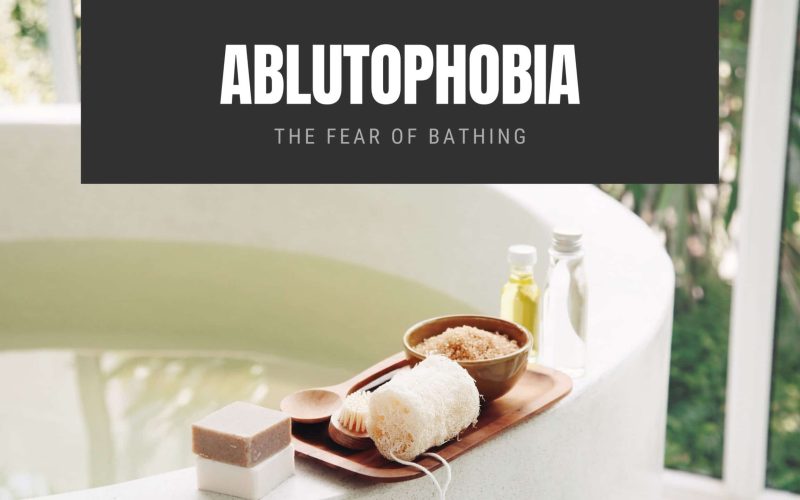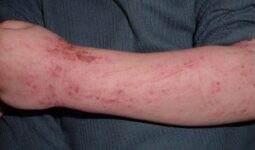It is socially essential for humans to have a bath. This daily exercise has become an innate trait embedded since birth. Notwithstanding, it may be surprising to find out that this simple practice causes fear in some individuals.
The irrational fear of bathing is referred to as ablutophobia, and many children may exhibit symptoms of this phobia. Many parents have to deal with their children throwing tantrums during bath time.
This doesn’t mean the presence of any mental complications, but rather, these kids may experience symptoms associated with ablutophobia.
Ultimately, people with this condition express fear when the thought of bathing runs through their minds.
People with ablutophobia would prefer not to have their bath or be bathed by someone else. Generally, sufferers may go many days before they have a shower.
Most people with this condition -if not all may also suffer from the smell that people find offensive.
Many individuals with a fear of bathing aren’t able to maintain healthy relationships with other people and may even be anti-social because of their condition.
Although the fear of bathing isn’t as common as the fear of dogs, the fear of water, or the fear of heights, nonetheless, it can be a debilitating disorder.
People with ablutophobia have been known to experience severe anxiety and even stress, especially when they feel that they have to take their bath,
Symptoms
Individuals who suffer from this phobia may find it challenging to clean or bathe themselves. They may even douse themselves with too much deodorant or perfume to mask the unpleasant smell.
It’s not uncommon for them to lie to others when asked why they looked unkempt or smelled funny.
People with ablutophobia may adopt a variety of habits so that they can skip bathing. Sadly, these defensive mechanisms only worsen the condition in the long term.
It also helps to know the symptoms caused by the fear of bathing are particularly triggered by another disorder that may include OCD (Obsessive Compulsive Disorder).
This may cause an affected person to obsess over the fear of having their bath till they can’t control their thoughts. Information like this can be beneficial when taking active steps to treat ablutophobia.
Some common symptoms associated with the disorder include:
- Anxiety when thinking about bathing
- Excess use of deodorants and colognes
- Fear of bathing
- Avoiding cleaning or bathing
Causes
Possible factors that may trigger ablutophobia may include genetics and one’s environment. Individuals with a family history of mental issues, particularly anxiety disorder or phobias, may have an increased chance of suffering from the fear of bathing.
Such an inclination for mental complications may require a traumatic experience for obvious psychological changes.
Traumatic scenarios such as near-death experiences or being sexually or physically abused while being around water may cause irrational fear of bathing.
These experiences may affect a victim to the point where they experience intense fear of bathing. It helps to consult with your doctor for proper diagnosis.
Relay all possible information to your healthcare provider, including the symptoms you may be experiencing.
Treatment
No specific treatment methodologies have been developed for ablutophobia. Nonetheless, CBT, anti-anxiety medications, and exposure therapy can be used to minimize the symptoms linked with the fear of bathing.
It is best to meet with a professional with extensive experience with treating ablutophobia and other anxiety disorders.
During treatment, patients may be asked to wash their face, hands, or other parts of their body during sessions.
While they may not be comfortable with this process, the aim is to minimize and control the level of anxiety that patients experience.
Cognitive Behavioral Therapy (CBT)
A psycho-social intervention aimed at improving a person’s mental health is referred to as CBT.
This is a tool that is commonly used to treat individuals with anxiety disorders such as generalized anxiety disorder (GAD) and obsessive-compulsive disorder (OCD).
Individuals with ablutophobia would also be able to benefit from CBT as well as equip them with the knowledge of why they think and respond to their unreasonable fears the way they do.
Considering the enormous automaticity of their symptoms, CBT can be beneficial for those with ablutophobia.
For example, they will almost always have an immediate involuntary reaction to their fear if exposed to what scares them.
This lack of introspection may be a significant part of why anyone with this disorder will struggle to the degree they will.
Cognitive-behavioral therapy will help you take a step back and thoroughly examine your worries more than usual.
In addition to knowing how to be more fastidious concerning understanding one’s particular fears, anyone participating in CBT with ablutophobia may also expect to develop other skills to help alleviate the distress induced by their disorder.
Mindfulness-Based Stress Reduction (MBSR)
MBSR is a 2-month evidence-based initiative that includes secular, comprehensive instruction in mindfulness to assist people with stress, anxiety, depression, and other kinds of mental distress.
As mindfulness meditation has been proven to be very useful for anxious people, MBSR may be able to dramatically benefit someone who is suffering from the fear of bathing.
People with ablutophobia can expect to learn a plethora of abilities in such a structured program that can help them reduce extreme cases of anxiety linked with their particular phobia.
Discuss with your doctor or therapist to see if the program can help to minimize the intensity of your symptoms of ablutophobia, including where to find MBSR programs in your vicinity.
Meditation
Several forms of meditation can be practiced to help people with ablutophobia. Mindfulness meditation has proven particularly useful in assisting individuals in achieving a calmer state of mind.
Mindfulness meditation can be incorporated in many ways, and meditation apps can be downloaded to assist individuals with the fear of bathing so they can practice better.
Mindfulness can significantly benefit those suffering from ablutophobia because how it can help them detach themselves from their anxiety by focusing their attention on other things that do not have any emotional baggage attached to them.
Breathing has been shown to be one of the most fundamental ways for a person to meditate and be present.
Individuals with ablutophobia who experience panic attacks may be able to redirect their attention to other sensations while they engage in breathing exercises.
This can significantly help them control the mental stress they may experience.
Implementing mindfulness meditation to relieve symptoms of ablutophobia would require patients to control their abdominal muscles and pay close attention to how their chest relaxes and contracts as they inhale or exhale.
With practice, patients can also focus on the sounds around them, the taste of foods they eat, certain smells, and how things feel against their skin. Sharpening one’s five senses will generally significantly reduce some of the anxiety connected with ablutophobia.
Knowing that being an adept meditator will require plenty of practice is also important.
Exposure Therapy
Exposure therapy is one of the most efficient ways to treat anxiety disorders caused by ablutophobia. It can be an effective way to desensitize a person suffering from a condition and their particular fears.
Notwithstanding, the therapist administering the therapy must be very competent. For instance, if the patient were slightly exposed to their object of fear, it may not be very effective because they may need a more significant amount of exposure to trigger any noticeable change.
Suppose the therapist was to expose someone with ablutophobia to their fear unnecessarily.
In that case, doing so could be extremely detrimental to the point that, because of the counseling alone, their ablutophobia became immensely worse.
Therefore, people with ablutophobia should consult with a practitioner who is well-equipped to introduce exposure therapy to their patients.
Exercise
Physical exercise has shown to be very beneficial for individuals experiencing anxiety disorders. Additionally, cardiovascular exercise can greatly help reduce stress in people who fear bathing.
This doesn’t mean that weight-resistance routines aren’t helpful to patients with anxiety; instead, aerobics helps to release endorphins (feel-good chemicals) in the brain.
According to the APA (American Psychology Association), physical activity can help train the mind to better cope with stressful conditions.
This is applicable when we consider the high amount of stress that the body is subjected to during strenuous exercise.
Engaging in some aerobic exercise will help minimize potential symptoms of ablutophobia substantially by making it easier for you to deal with the anxiety and stress linked with this disorder.
Aerobic modalities such as swimming, skiing, biking, jogging, and walking are great routines for helping reduce the symptoms of ablutophobia.
Playing tennis, basketball, soccer, racquetball, and other sports can also be great exercise.
Consistently engaging in exercise can help reduce the stress associated with ablutophobia over time.
Yoga
Several yoga stances can significantly help anyone suffering from the fear of bathing. Yoga consistently emits a meditative state of mind in those who engage in it.
It helps to think of yoga as meditation in action. Since the mind can be diverted to something more positive by participating in yoga, it will help alleviate some of the anxiety linked with ablutophobia.
Someone with ablutophobia can benefit from many forms of yoga, such as hot yoga or hatha yoga, among many others.
Nonetheless, nearly all of them will help reduce some of the tension and anxiety associated with the fear of bathing, regardless of the types of yoga that exist.
If yoga has never been your thing, taking a class or watching videos online can help you through several poses.
Like meditation, the more practice you put into yoga, the more adept you will become at it.
People practicing yoga should also expect improved strength and endurance, among other benefits.
Minimize Your Caffeine Intake
It is no news that large consumption of caffeine can trigger anxiety. This makes sense as we look carefully at how caffeine controls the physiology of our body.
When we take a high dose of caffeine, our heart beats more rapidly, making us tenser. “Our body might go into a “fight or flight” state of mind.
For those with ablutophobia to experience panic attacks, such a state is also a precursor.
Consuming little or no caffeine during the day can also help to reduce anxiety dramatically.
Certain energy drinks and beverages, such as coffee and tea, contain caffeine. Some foods, including dark chocolate, also contain caffeine.
You may minimize some of the symptoms associated with ablutophobia by becoming more mindful of your daily caffeine intake.
Dialectical Behavior Therapy (DBT)
DBT is a very efficient form of care for individuals struggling with emotion control. It is also used to help people who suffer from borderline personality disorder.
Notwithstanding, for those suffering from anxiety disorders like ablutophobia, it may also be rather valuable.
This can result from many of the coping abilities you would expect to learn in a DBT class.
Generally, these groups last around six months and may have two or more individuals participating in the program.
Half-smiling is one very useful “Dialectical Behavior Therapy” skill for helping those with ablutophobia. This method makes you think about what you fear or disturb you all by smiling softly.
This method works by making you think about what you fear or disturb you while you smile.
Although half-smiling is not all the battle, you must avoid entertaining negative feelings that your particular fear might evoke.
Mindfulness meditation is also generally adopted in DBT, and when it is performed in a group atmosphere, it can greatly benefit people with ablutophobia.
Drinking hot tea to focus on the senses or simply concentrating on your breathing can greatly help.
Psychiatric Medications
- Anti-anxiety meds
To help avoid panic attacks, these forms of medications are very useful. Because people with phobias quite frequently experience panic attacks, such medications can be incredibly helpful for individuals who have serious ablutophobia. Valium, Xanax, Klonopin, and others are some popular anti-anxiety drugs.
Usually, these medications are not administered regularly, but they can be routinely taken depending on how severe the ablutophobia is. Nevertheless, before you decide to take any medications, you should first discuss this with your doctor to make sure it is safe.
- Antidepressants
These forms of medicines aren’t just for people with depression. They can also help people suffering from anxiety disorders such as ablutophobia.
Zoloft, Paxil, and Lexapro, amongst many others, are some popular antidepressants. These medications may reduce some of the effects of ablutophobia.
These prescriptions can be taken regularly, and many people take them to control panic attack incidences. However, they are most commonly used daily to minimize the anxiety that people may experience.
Consult a physician to see how you can significantly lower your symptoms of ablutophobia by taking antidepressants. Also, find out how safe you can take the medication.







